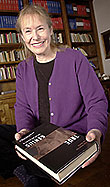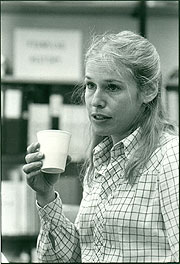Fermilab Historian Lillian Hoddeson wins APS prize
 |
|
Lillian Hoddeson
|
Fermilab Historian and University of Illinois Professor of History Emeritus Lillian Hoddeson couldn't believe the email at first. It said she was the recipient of the 2012 Abraham Pais Prize for History of Physics
"The people who have won this award in the past are my heroes," Hoddeson said.
The American Physical Society (APS) awards the prize annually to someone who has made outstanding scholarly contributions in the field of the history of physics. The winner receives $10,000 and gives a lecture on the history of physics at the annual APS conference.
"It's a great honor. I'm very happy to be recognized in this way for the work I've done," Hoddeson said.
Hoddeson, who holds a Ph.D. in solid state physics from Columbia University, knew she was interested in the history of physics even before entering graduate school, but she didn't know how to pursue it.
"It was hardly a field yet," Hoddeson said.
After earning her doctorate, she spent some time teaching in New York. She found herself incorporating more and more history into her courses. Ruth Cowan, a friend from Hoddeson's undergraduate years at Barnard College, and by this time an established historian of science, suggested she take a course with Thomas Kuhn at Princeton.
"Ruth told me I needed to get a real taste of what the professional world of history of science is like now, so I enrolled in Kuhn's 'History of Quantum Mechanics' course at Princeton," Hoddeson said. "It was a real eye-opener."
The course was difficult. Hoddeson and her classmates studied original scientific papers by Niels Bohr, Arnold Sommerfeld, Werner Heisenberg and others, in their original German. She struggled, but loved it.
"I found it to be an enormous high," Hoddeson said.
She applied for a fellowship and spent the following year immersed in history of physics studies.
In 1976, Hoddeson left her physics research and moved to Urbana. A year later, she received a call from Dick Carrigan at Fermilab. They were setting up a history program and wanted Hoddeson's help. Hoddeson lived nearly three hours south of Fermilab, so she agreed to the proposal on a part-time, one week a month, basis. She continued the arrangement until her appointment in the Department of History at the University of Illinois caused her to reduce her time to a few days a month at the laboratory.

Lillian Hoddeson in the early 1980s.
"I met Lillian a few years after she moved to Illinois," said Adrienne Kolb, who has worked as an archivist and author with Hoddeson since 1983. "She commutes, choosing days when we can work together researching historical documents in the collections of Fermilab's History Room and Archives, conducting oral history interviews, and writing articles and books on Fermilab and the SSC."
The two women, along with Catherine Westfall, who was a graduate student when she began working with Hoddeson and Kolb, and is now on the faculty at Michigan State University, co-authored the book, "Fermilab: Physics, the Frontier, and Megascience," as well as several academic articles.
In the 1990s Hoddeson also teamed up with Michael Riordan, a former physicist and co-editor of SLAC Beamline, to author "Crystal Fire: The Birth of the Information Age," which relates the history of the transistor. At about the same time, with her graduate student, Vicki Daitch, Hoddeson coauthored a biography of John Bardeen titled "True Genius: the Life and Science of John Bardeen." Earlier, with other collaborators, she wrote "Critical Assembly: a History of Los Alamos During the Oppenheimer Years," and coedited "Out of the Crystal Maze: Chapters from the History of Solid State Physics," and three volumes on the history of particle physics based on conferences held at Fermilab and SLAC.
Currently, Hoddeson, Kolb and Riordan are collaborating on an extensive NSF report about the history of the Superconducting Super Collider, which was under construction in Texas when it was cancelled by Congress in 1993. They hope to submit the report, currently tipping the literary scales at 300 pages, before Thanksgiving. Hoddeson considers this work to be the first draft of a book that will be completed in the next few years.
Hoddeson is also working on two other books on her own. The first is a biography of Michigan inventor Stanford Ovshinsky, and the second book is a monograph on oral history and human memory.
"Ovshinsky was a friend of Fermilab founding director Robert R. Wilson, and his inventions were in the fields of alternative energy and information," Hoddeson said. "He believed that those were the two pillars of the modern world."
Even with all of these projects, Hoddeson and Kolb continue working to preserve Fermilab's history.
"We both have this notion that the work at Fermilab fits into a broader program of historical physics," Kolb said. "It has a place in world history. It's that important."
—Ashley WennersHerron
|